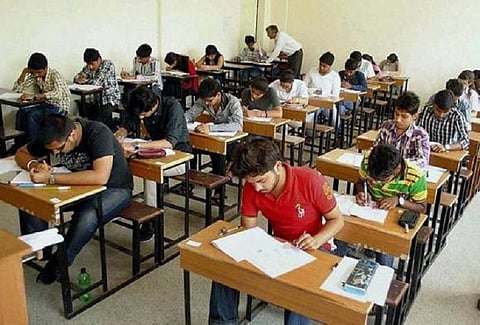

If you were to believe the movies, college is the place to be for a young person in India. You can wear swanky, stylish clothes, fall in love with the hottest person on campus, sing duets around trees, bunk classes and make fun of professors all day. However, colleges in India, especially in the South, are anything but this fantasy land. Much has been written about the draconian rules and iron fists that control our campuses today. The deemed universities, in particular, function like islands run by whimsical kings who seem to spend all their time cooking up one absurd rule after another.
While students are speaking up about the kind of harassment and violation that they face in these institutions, it remains to be asked why these colleges and universities continue to be in high demand year after year. Why are young people entering these loony, narrow-minded prisons when they should be spending this time broadening their minds?
There is, of course, insane competition for college admissions in our country, especially for professional courses. Every year, lakhs of students write competitive exams to follow their dream… or their parents’ dream. It’s not as if they can be picky about which college they should select. But talking to students about their decision to join such colleges reveals a disturbing trend – for quite a few, their parents wanted them to go to these colleges precisely because they were prisons!
Sidharth Balachandran, who went to the infamous Jeppiaar Engineering College in Chennai, says that this was especially true when it came to the hostel students. Anxious parents, who are discomfited by the thought of their near-adult child leaving home and its controls, find the ‘notorious discipline’ of these institutions reassuring. There is great fear among parents that their son or daughter will end up in "bad company" and pick up "bad habits" that could ruin their lives. They appreciate the college authorities for functioning as stand-in parents, breathing down the neck of their wards.
You’d think the NRIs who send their children to India might have more liberal views, considering that they have more exposure, but Sidharth says that in his experience, it was the NRI parents who were all the more happy about the "discipline" aspect. Ahalya Natarajan, who went to another such institution, echoes Sidharth. "Parents fear that their children will go astray," she says. "Many were actually happy about these rules."
'Go astray' is a long laundry list and the term "love marriage" probably tops it for many Indian parents. The fear that their child might end up with someone of another caste or worse, religion, is so high that parents welcome the stifling gender segregation rules that many of these institutions have. Last month, the Kerala High Court dismissed the petition of a 19-year-old woman who was fighting her dismissal from Mar Thoma College of Science and Technology. Her crime? She was living in with a male student. An adult, just to be clear. The college felt this was rank indiscipline and threw them out. The gist of the rather long-winded verdict is that though the Court did not want to interfere in a personal matter, the college was well within its rights to do what it did.
Crazy college rules have been a part of our fabric for a long time now. I went to Stella Maris College in Chennai where I (and all of my friends), signed a "contract" that said we wouldn’t wear "immodest clothes" to college. It’s another thing that we later sat in lecture halls, studied feminist thought and discovered that there was no such thing as "immodest". Discriminatory hostel rules for boys and girls have existed across the country for a while too. S, who studies at the Indian Law School, Pune, says, “I stayed two years in the ILS hostel. While the girls’ hostel has an in time of 8:30 pm, the boys have an in time of 10 pm which was never strictly followed. If the girls were even two minutes late, the guards would create a scene. When we took up the matter with our principal she actually said ' you girls are my liability' and that was when I decided to leave the hostel.”
From controlling what students should wear and what they should do on campus, colleges are increasingly violating young people’s personal freedoms. And sadly, they seem to have many parents on their side, ardently cheering them on. As far as the parents are concerned, love and other non-academic interests are, at best, unnecessary distractions that stand in the way of their children ‘settling down’.
I wonder if the parents have paused to contemplate the psychological impact that all this ‘disciplining’ has on their children. Many young people who emerge out of these ‘prisons’ may have a degree in hand but lack social skills (especially when it comes to interacting with other genders), decisiveness, and the ability to make a choice. And when they reach adulthood in a space where sexism and misogyny are practised as a matter of law, it is no surprise that they carry forward this conditioning when they step out of the gates of the campus as well. It's time we asked not just who will guard the guards but who will send them to the dry-cleaners.